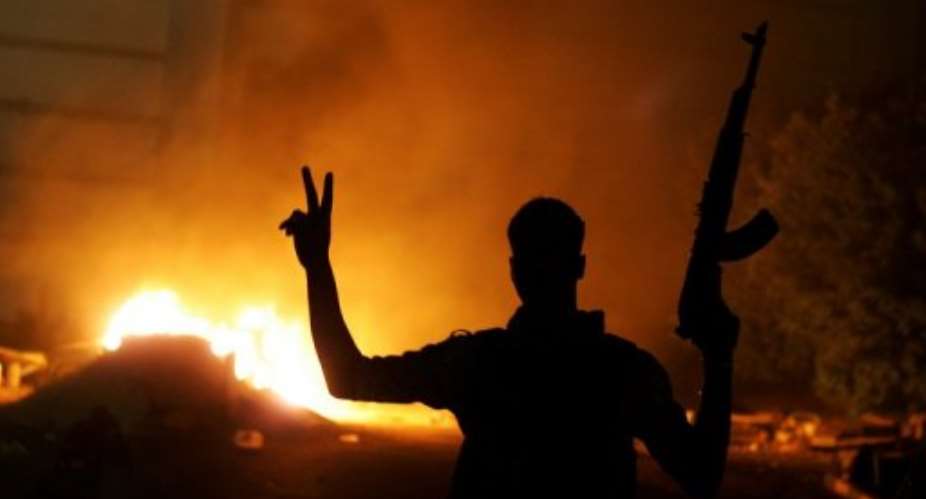TRIPOLI (AFP) - A Libyan crackdown on lawless militias spread to the capital on Sunday after armed groups that have not been integrated into state institutions were ordered to disband and evacuate their bases.
Commander in chief Yussef al-Mangush said on his Facebook page that the armed forces had dislodged a militia from a military complex on the highway to Tripoli International Airport, arresting militiamen and confiscating their weapons.
The sound of gunfire was heard in the area at 9 am (0700 GMT) and lasted less than a minute, an AFP journalist said, but Mangush made no mention of casualties.
"We will carry out these kind of operations for the next two or three weeks until we dislodge all armed groups not under the authority of the State," an army officer told AFP on condition of anonymity.
On Saturday, the army issued an ultimatum ordering militias and armed groups to evacuate military compounds, state property and the properties of members of the former regime in and near Tripoli, the official LANA news agency reported.
It ordered "all individuals and armed groups occupying military barracks, public buildings or property belonging to members of the former regime... to evacuate these sites within 48 hours."
Hundreds of former rebels have taken over strategic, state-owned military and civilian facilities and properties of supporters and relatives of dead dictator Moamer Kadhafi in the wake of his fall and death last year.
The army warned it would "use force if necessary."
The Tripoli eviction comes hours after Mohammed al-Megaryef, head of the national assembly, announced the decision to dissolve all militias that do not come under state authority.
Speaking in Benghazi, Megaryef said the authorities had decided to set up an "operations room" in the eastern city that will include the army, interior ministry forces and defence ministry brigades comprising former rebels.
He also called on the army to place its own officers to head brigades born out of the 2011 revolt, which escalated into the civil war that toppled Kadhafi.
The new authorities have been unable to disband or discipline these civilians-turned-fighters, though many of their units have joined the defence and interior ministries.
The crackdown comes after massive anti-militia protests in Benghazi on Friday and after an attack on the US consulate there sparked by a US-made film that mocks Islam left four Americans, including ambassador Chris Stevens, dead.
On Friday, hundreds of people, some armed, stormed bases of militias sparking clashes that left 11 dead and dozens wounded. Fighting centred on the main base of Raf Allah al-Sahati, a Salafist brigade under the defence ministry.
Six members of the security forces were among those killed in the unrest that rocked Libya's second city. They appeared to have been executed, a medical examiner at the Benghazi Medical Centre morgue told AFP.
Critics say militias in the eastern city have put themselves above the law, particularly those that refused to be placed under defence ministry authority after the fall of Kadhafi's regime.
Demonstrators first evicted a group based in a security building in central Benghazi before turning their wrath on the headquarters of Ansar al-Sharia, a radical Salafist militia.
Ansar al-Sharia has been accused of -- but denied -- involvement in the murder of the four Americans in the US consulate.
Megaryef initially welcomed the Benghazi protest but as the violence expanded the authorities called on the demonstrators to distinguish between "illegitimate" brigades and those under state control.
The warning highlighted the dilemma facing the government, with the fledgling security forces dependent on former rebels who fought in the uprising although such groups also challenge government authority.
The trigger for the assault on the paramilitaries was a "Save Benghazi" rally after the main weekly Muslim prayers on Friday that was attended by an estimated 30,000 peaceful demonstrators.
They paid tribute to Stevens and called for justice.
Their massive protest drowned out a smaller rally of a few hundred people called by the jihadists and hardline Islamists furious over the US-made film and cartoons of the Prophet Mohammed published by a French satirical magazine.





 There’s nothing you can do for us; just give us electricity to save our collapsi...
There’s nothing you can do for us; just give us electricity to save our collapsi...
 Ghanaian media failing in watchdog duties — Sulemana Braimah
Ghanaian media failing in watchdog duties — Sulemana Braimah
 On any scale, Mahama can't match Bawumia — NPP Youth Organiser
On any scale, Mahama can't match Bawumia — NPP Youth Organiser
 Never tag me as an NPP pastor; I'm 'pained' the 'Akyem Mafia' are still in charg...
Never tag me as an NPP pastor; I'm 'pained' the 'Akyem Mafia' are still in charg...
 Your refusal to dedicate a project to Atta Mills means you never loved him — Kok...
Your refusal to dedicate a project to Atta Mills means you never loved him — Kok...
 2024 elections: I'm competent, not just a dreamer; vote for me — Alan
2024 elections: I'm competent, not just a dreamer; vote for me — Alan
 2024 elections: Forget NPP, NDC; I've the Holy Spirit backing me and nothing wil...
2024 elections: Forget NPP, NDC; I've the Holy Spirit backing me and nothing wil...
 2024 elections: We've no trust in judiciary; we'll ensure ballots are well secur...
2024 elections: We've no trust in judiciary; we'll ensure ballots are well secur...
 Performance tracker: Fire MCEs, DCEs who document Mahama's projects; they're not...
Performance tracker: Fire MCEs, DCEs who document Mahama's projects; they're not...
 Train crash: Railway ministry shares footage of incident
Train crash: Railway ministry shares footage of incident
